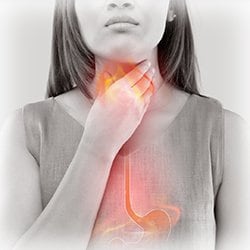Do You Have These Symptoms of GERD?
 If you experience heartburn often, it may be an indicator of GERD.
If you experience heartburn often, it may be an indicator of GERD.
The occasional burning sensation in your chest after eating can usually be a case of heartburn, but if you experience heartburn regularly or notice other accompanying symptoms, you may have gastroesophageal reflux disease (GERD).
What is GERD?
Preeya Goyal MD., a gastroenterologist at PIH Health, describes GERD as a “digestive disorder where stomach acid flows back into your esophagus, irritating the lining of your esophagus, causing heartburn and other symptoms.”
How do you know if you have GERD and not just heartburn? If you have some or all of the symptoms listed below and experience them often, you should speak to a doctor who can confirm a diagnosis and discuss treatment options.
What are the symptoms of GERD?
The most common sign of GERD is heartburn which may range from mild to severe and usually occurs after eating but can be worse at night when you lie down. Other symptoms may include:
- A burning, sharp, or tight sensation in your chest
- A bitter or sour taste in your mouth or throat
- Regurgitation of food or liquid
- Trouble swallowing
- Feeling like a lump in your throat
- A persistent cough
- A sore throat
- Laryngitis (inflamed vocal cords)
- New or worsening asthma
- Bad breath
- Damage to tooth enamel (due to excess acid)
If you have chest pain, especially if it is accompanied by pain in your arm or jaw, shortness of breath, feeling lightheaded or faint, breaking out in a cold sweat, nausea, vomiting, or extreme fatigue, seek immediate medical care. These may be signs of a heart attack.
What causes GERD?
At the opening of your lower esophagus, there's a circular muscle called the lower esophageal sphincter (LES) connected to your stomach. This muscle tightens after food passes down your esophagus into your stomach. But, if this muscle does not contract properly, the digestive acid from your stomach can move back into your esophagus, also known as acid reflux. Some people only experience occasional heartburn due to acid reflux, but if you have GERD, symptoms are more likely to happen often.
How is GERD treated?
“There are various ways to treat GERD, including lifestyle changes and medication,” explains Dr. Goyal. “This could mean adjusting your diet, losing weight, not wearing tight-fitting clothing, eating smaller meals, staying upright for a few hours after eating, and not smoking or drinking alcohol may also help. Medications can also reduce the effects of stomach acid on the esophagus or lower the amount of acid produced by the stomach.”
People find different levels of effectiveness in treating their symptoms with lifestyle changes and medications. Surgery may be needed to reinforce the lower esophageal sphincter, but this is usually a last-resort option.
To learn more about GERD and other gastroenterology conditions we treat, visit our Digestive Heath services at PIHHealth.org.
Copyright 2022 © Baldwin Publishing, Inc. All rights reserved. Health eCooking® is a registered trademark of Baldwin Publishing, Inc. Cook eKitchen™ is a designated trademark of Baldwin Publishing, Inc. Any duplication or distribution of the information contained herein without the express approval of Baldwin Publishing, Inc. is strictly prohibited